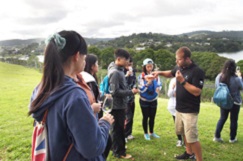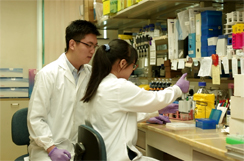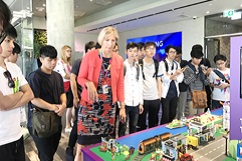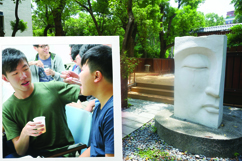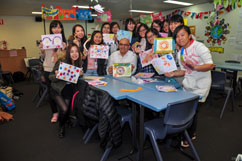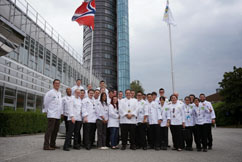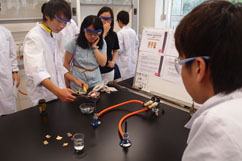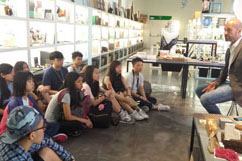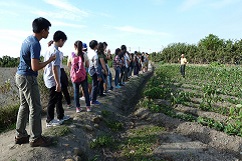{ VTC Student Development Foundation }
|
|
|
New Zealand wine knowledge exchange
Hotel and Tourism Institute (HTI) , a member of VTC, has sent its students to New Zealand to learn the pairing of wine and cuisines, with a view of letting the participants reflect on how they could enhance the culinary experience of diners. Jireh Woo, a Diploma in Food and Beverage Operations student who visited the vineyard estates of Waiheke Island, said: “Cooler weather conditions in New Zealand enhance the acidity level of grapes cultivated there and white wine produced from the fruits is imbued with a unique flavour. Pairing it with seafood and dessert could accentuate the taste further. Upon returning to Hong Kong, I have registered for a sommelier course, hoping I could use my wine-food pairing knowledge in my work to enhance the dining experience of customers.”
|
|
|
Research attachment in Singapore National Cancer Centre Singapore (NCCS) has built a sound reputation in Asia with the high standards of its research and medical services. During her attachment there, Wendy Yeung, a Higher Diploma in Biotechnology student, provided assistance for a research project focusing on the impact of liver cancer drugs on tumour growth. “Immunotherapy points to a major direction in cancer research currently. At NCCS, I learned advanced techniques like Western Blot and had opportunities to interact with colleagues of different nationalities and cultural background. Besides strengthening my research and communication skills, the experience taught me to experiment boldly with a meticulous mindset and bolstered my self-confidence indirectly. I hope to take up a career in cancer research after graduating from university.” |
|
|
Summer course of Tallinn University of Technology in Estonia
Tallinn, Estonia is one of the world’s most advanced smart cities where technology applications are prevalent, such as the use of food-delivery robots and driverless buses on trial runs. Inspired by his exchange experience there, Clement Yu, a Higher Diploma in Software Engineering student, said: “I believe innovation is indispensable to the development of smart cities. We must think out of the box and look at things from a fresh perspective to acquire an innovative mindset, instead of repeating what we did in the past.” Upon his return from Tallinn, Clement and his classmates have started researching on how to develop more Internet of Things (IOT)-related applications with the use of robots and mini-computers, to make life more efficient.”
|
|
|
Life-and-death education and counseling in Taiwan
Ms Alice Kwong, senior lecturer of VTC’s Department of Childcare, Elderly and Community Services, said: “Demand for elderly hospice care and grief counseling for family members is rising continually. We hope our students could gain a better understanding of these issues. Such related services are more developed in Taiwan, where students could immerse themselves in experiential activities, like ‘being taken care of’ and ‘sleeping in a coffin’, to put themselves in the shoes of the elderly to understand their mindset and needs. They could also visit a ‘healing garden’ to understand how the layout of different zones, such as the ‘tears pond’ and ‘memorial lawn’, combined with professional counseling, could help people in need emerge from grief, and provide inspiration for our students.”
|
|
|
Child care education exchange in Australia
Mrs Vega Poon, Senior Lecturer of the Department of Child Education and Community Services said: “Social Constructivism is a theory often discussed in child education. The emphasis is placed on the independent nature of learning, where children take the initiative to discover and construct the things they learn. Australia has done excellent work in putting the concept into practice.” Cheung Fung Yee, a Higher Diploma student in Child Care and Education recalled: “In Australia, young children roam in gardens where they are free to choose what they want to learn from nature. The activity inspires them to learn through their own creative efforts. Teachers lead children by asking questions and passing on new knowledge whom have a pivotal role in stimulating a child’s desire for independent learning. Flexible teaching methods are therefore of utmost importance.”
|
|
|
Worldchefs Congress in Norway
Organised by the World Association of Chefs’ Societies, the Worldchefs Congress has a long 86-year history. By attending the Congress, students witnessed international chefs pit their skills in cooking contests and undertook exchanges with industry professionals. Lectures by professional chefs and site visits also drew attention to global topics such as food shortages and waste treatment. Exposure to these enabled students’ understanding of the food culture and latest development trends, prompting them to rethink the issues and come up with innovative solutions. Yiu On Kei, a Diploma in European Cuisine student said: “I have never thought that Dong Po Pork could be prepared by Western culinary methods. The world is evolving and we must change with times to progress continuously!”
|
|
|
Undergraduate research projects undertaken at tertiary institutions in Japan
Japan is a nation renowned for its advanced industrial technology, where its tertiary institutions are equipped with comprehensive laboratories for complex experiments, including those considered unfeasible in Hong Kong. Last year, some of our students undertook their research projects there, which reinforced their theoretical knowledge learnt from the textbooks. Yip Cheuk Kei, a Higher Diploma student in Mechanical Engineering, treasured the opportunity he was given to work in one of these facilities: “The undergraduate research project I did in Japan was to study how the impact produced from the blasting of explosives could facilitate metals to form shapes. During when, I had the opportunity to design, process and produce the object on my own. It offered me a valuable first-hand experience to implement the entire experimental process myself. Such an opportunity would be unthinkable in Hong Kong, at least for the time being!”
|
|
|
Elective course at Elisava Barcelona School of Design in Spain
THEi partnered a top design school in Spain to develop an elective course for students from the Design Faculty. Aside from classroom training, a local field trip, including a bicycle tour of Barcelona and visit to the government-owned Materfad Materials Centre, was added to let students experience the open education in Spain and understand how the country’s history and culture influenced its designers and artists in outlook. Lai Sze Pui, a product design student in the programme said: “The locals are highly environmentally conscious. When designing functional products, they often exercise the highest level of creativity, with the lowest-cost solutions possible, such as using a fan-shaped plastic film on a wine glass with a lit candle inside to turn it into a unique-looking lamp. Their idea of converting old items into new ones inspired me to reflect on my approach to product design.”
|
|
|
Agriculture study trip in Taiwan
Collaborating with the Taiwan National University, the IVE Applied Science Department organised an agricultural field trip for a elegation of students. The itinerary included a visit to the University’s experimental farm, seminar by the Taiwan Executive Yuan where local government officials were invited to speak, and study how private organic farm operates. Mr Chris Ho, a lecturer in the visiting team, said: “Taiwan’s agricultural industry has a longstanding history, with a reputation in advanced farming technology. The island is similar to Hong Kong in climate, environment and lifestyle, thus there is much to learn. The trip familiarised our students with their agricultural policies and the sector’s latest developments. In addition, they also soaked up considerable knowledge on organic farming and arboriculture, particularly on brown root rot, together with the preventive and curative measures to take against this virulent disease in trees. Such know-how is hard to come by in Hong Kong, and offers useful knowledge and experiences that our city could draw on.”
|
|

Giving to VTC






